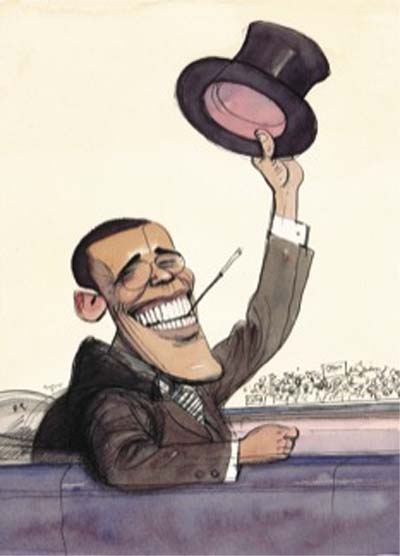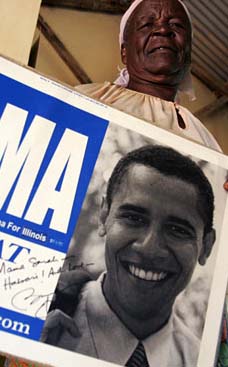
"When the reporter pressed Roosevelt to offer a vision of his own historical opportunity, he gave two answers. First, he said, America needed “someone whose interests are not special but general, someone who can understand and treat the country as a whole. For as much as anything it needs to be reaffirmed at this juncture that the United States is one organic entity, that no interest, no class, no section, is either separate or supreme above the interests of all.” But Roosevelt didn’t limit himself to the benign self-portrait of a unifying President. “Moral leadership” had a philosophical component: he was, he said, “a liberal.” The election of 1932 arrived at one of those recurring moments when “the general problems of civilization change in such a way that new difficulties of adjustment are presented to government.” As opposed to a conservative or a radical, Roosevelt concluded, a liberal “recognizes the need of new machinery” but also “works to control the processes of change, to the end that the break with the old pattern may not be too violent.”" Journalist George Packer served as a Peace Corps Volunteer in Togo.
George Packer writes: How the economic crisis can help Obama redefine the Democrats
The New Liberalism
How the economic crisis can help Obama redefine the Democrats.
by George Packer November 17, 2008
In September, 1932, Franklin Delano Roosevelt, the Democratic nominee for President, was asked by a reporter for his view of the job that he was seeking. “The Presidency is not merely an administrative office,” Roosevelt said. “That’s the least of it. It is more than an engineering job, efficient or inefficient. It is preëminently a place of moral leadership. All our great Presidents were leaders of thought at times when certain historic ideas in the life of the nation had to be clarified.” He went down the list of what we would now call transformative Presidents: Washington, Jefferson, Jackson, Lincoln, Theodore Roosevelt, Wilson. (He also included Grover Cleveland, who hasn’t aged as well.) Then Roosevelt asked, “Isn’t that what the office is, a superb opportunity for reapplying—applying in new conditions—the simple rules of human conduct we always go back to? I stress the modern application, because we are always moving on; the technical and economic environment changes, and never so quickly as now. Without leadership alert and sensitive to change, we are bogged up or lose our way, as we have lost it in the past decade.”
When the reporter pressed Roosevelt to offer a vision of his own historical opportunity, he gave two answers. First, he said, America needed “someone whose interests are not special but general, someone who can understand and treat the country as a whole. For as much as anything it needs to be reaffirmed at this juncture that the United States is one organic entity, that no interest, no class, no section, is either separate or supreme above the interests of all.” But Roosevelt didn’t limit himself to the benign self-portrait of a unifying President. “Moral leadership” had a philosophical component: he was, he said, “a liberal.” The election of 1932 arrived at one of those recurring moments when “the general problems of civilization change in such a way that new difficulties of adjustment are presented to government.” As opposed to a conservative or a radical, Roosevelt concluded, a liberal “recognizes the need of new machinery” but also “works to control the processes of change, to the end that the break with the old pattern may not be too violent.”
That November, Roosevelt defeated President Herbert Hoover in a landslide. His election ended an age of conservative Republican rule, created a Democratic coalition that endured for the next four decades, and fundamentally changed the American idea of the relationship between citizen and state. On March 4, 1933, Roosevelt was inaugurated under a bleak sky, at the darkest hour of the Great Depression, with banks across the country failing, hundreds of thousands of homes and farms foreclosed, and a quarter of Americans out of work.
In defining his idea of the Presidency, Roosevelt had left himself considerable room for maneuvering. His campaign slogan of a “new deal” promised change, but to different observers this meant wildly different things, from a planned economy to a balanced budget. “Roosevelt arrived in Washington with no firm commitments, apart from his promise to ‘try something,’ ” the Times editorialist Adam Cohen writes in his forthcoming book, “Nothing to Fear: FDR’s Inner Circle and the Hundred Days That Created Modern America.” “At a time when Americans were drawn to ideologies of all sorts, he was not wedded to any overarching theory.”
Barack Obama’s decisive defeat of John McCain is the most important victory of a Democratic candidate since 1932. It brings to a close another conservative era, one that rose amid the ashes of the New Deal coalition in the late sixties, consolidated its power with the election of Ronald Reagan, in 1980, and immolated itself during the Presidency of George W. Bush. Obama will enter the White House at a moment of economic crisis worse than anything the nation has seen since the Great Depression; the old assumptions of free-market fundamentalism have, like a charlatan’s incantations, failed to work, and the need for some “new machinery” is painfully obvious. But what philosophy of government will characterize it?
The answer was given three days before the election by a soldier and memoirist of the Reagan revolution, Peggy Noonan, who wrote in the Wall Street Journal, “Something new is happening in America. It is the imminent arrival of a new liberal moment.” The Journal’s editorial page anticipated with dread “one of the most profound political and ideological shifts in U.S. history. Liberals would dominate the entire government in a way they haven’t since 1965, or 1933. In other words, the election would mark the restoration of the activist government that fell out of public favor in the 1970s.” The Journal’s nightmare scenario of America under President Obama and a Democratic Congress included health care for all, a green revolution, expanded voting rights, due process for terror suspects, more powerful unions, financial regulation, and a shift of the tax burden upward. (If the editorial had had more space, full employment and the conquest of disease might have made the list.)
For the first time since the Johnson Administration, the idea that government should take bold action to create equal opportunity for all citizens doesn’t have to explain itself in a defensive mumble. That idea is ascendant in 2008 because it answers the times. These political circumstances, even more than the election of the first black American to the highest office, make Obama’s victory historic. Whether his Presidency will be transformative, in the manner of Roosevelt and the handful of predecessors named by F.D.R. in 1932, will depend, in part, on history—it’s unclear whether today’s financial troubles will offer a political challenge, and an opportunity, of the magnitude of the Great Depression. But the power of Obama’s Presidency will ultimately hinge on how he chooses to interpret the “modern application” of liberalism in the twenty-first century.
Read the rest of this article at the New Yorker.













